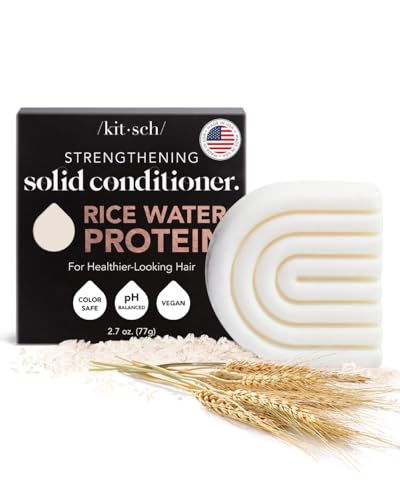
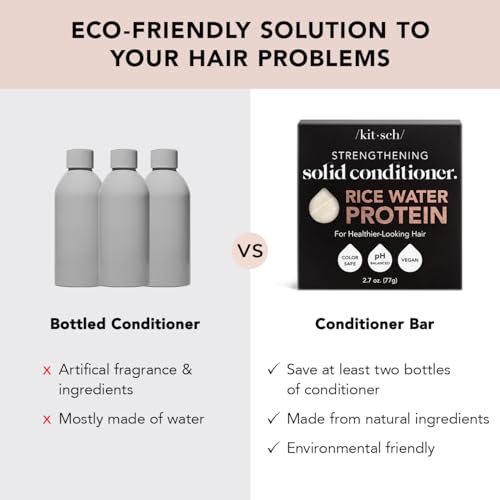
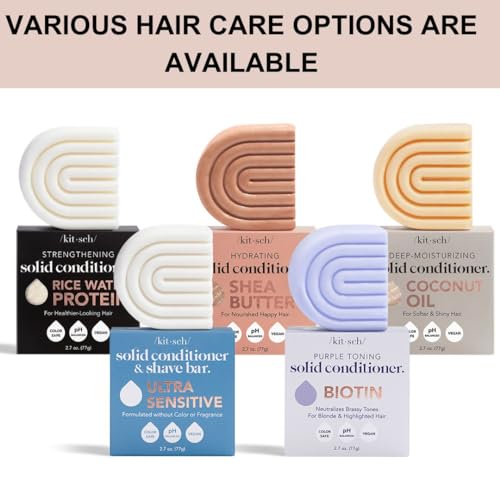
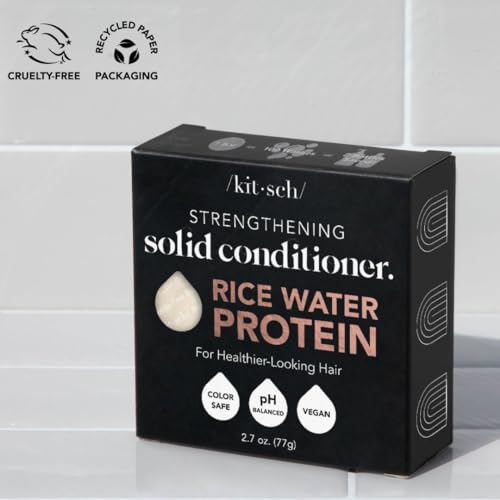
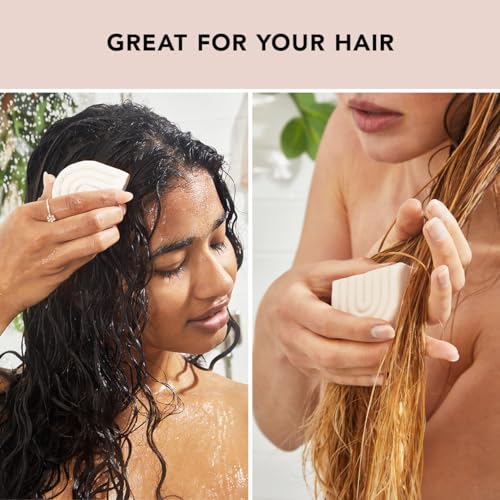
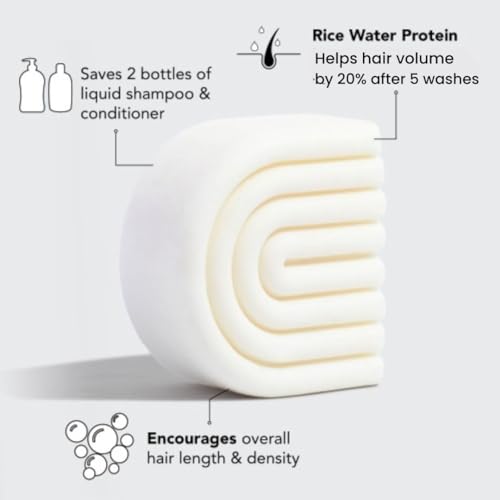
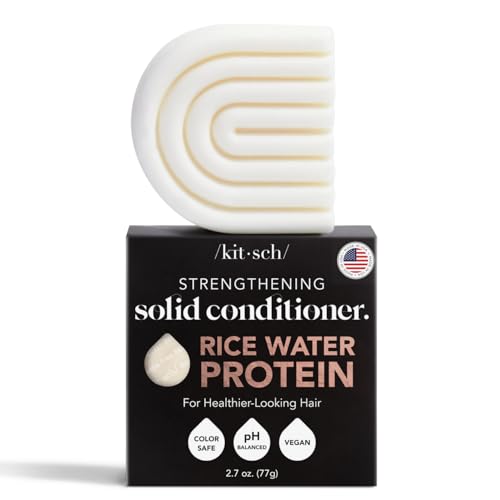
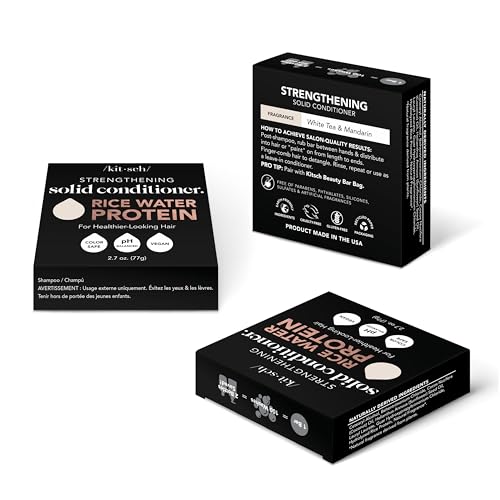
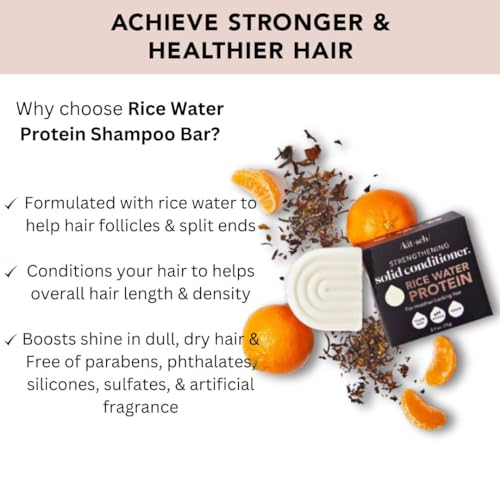
Kitsch Rice Water Conditioner Bar - Strengthens & Moisturizes All Hair Types, Vegan - 2.7oz


Behentrimonium Chloride
High RiskBehentrimonium chloride is a quaternary ammonium compound primarily used as a conditioning agent in hair and skin care products. It functions as an emulsifier and surfactant, helping to improve texture and manageability of hair.
Sustai Insights
Behentrimonium chloride offers functional benefits as a hair conditioner and emulsifier. However, it is associated with moderate allergenic potential and has high use restrictions due to regulatory concerns. It poses low risks for carcinogenicity and developmental toxicity but has been noted for neurotoxicity. Environmental risks include potential pollution and low biodegradability. Overall, the ingredient is assessed as high risk, and users should consider alternatives such as natural conditioners.
Helianthus Annuus (Sunflower) Seed
Low RiskHelianthus annuus (sunflower) seed is derived from the seeds of the sunflower plant and is commonly used in various cosmetic and personal care products. It serves primarily as an emollient and skin conditioning agent, providing moisture and enhancing the texture of formulations.
Sustai Insights
Helianthus annuus (sunflower) seed offers functional benefits, including skin conditioning and moisturizing properties, while being sustainably sourced and biodegradable. Health risks are minimal, with low concerns for carcinogenicity, allergies, and reproductive toxicity. Environmentally, it presents low risks of pollution or bioaccumulation. Regulatory assessments indicate no current restrictions. Overall, it is considered a low-risk ingredient, and safe usage practices should be maintained. Alternative ingredients may include other plant-based oils, but the sunflower seed oil remains a viable option.
Lauryl Laurate
Low RiskLauryl laurate is an ester derived from lauryl alcohol and lauric acid, commonly used in cosmetic formulations as an emollient and surfactant. It contributes to the texture and spreadability of products, enhancing their overall feel on the skin.
Sustai Insights
Lauryl laurate offers functional benefits as a skin-conditioning agent and emulsifier, contributing to product stability. It is considered low risk for health concerns such as carcinogenicity, allergies, and reproductive toxicity. Environmental assessments indicate minimal pollutant potential. Regulatory bodies do not impose significant restrictions. Overall, the ingredient is deemed low risk for use in cosmetic applications, with no specific alternatives identified.
Hydrolyzed Rice Protein
Low RiskHydrolyzed rice protein is a hydrolysate of rice protein, commonly used in cosmetic and personal care products for its film-forming and moisturizing properties. It serves as a conditioning agent that can enhance the texture and feel of formulations.
Sustai Insights
Hydrolyzed rice protein offers functional benefits such as improving moisture retention and hair manageability. It is derived from renewable sources and is biodegradable. Health risks are generally low, with minimal concerns regarding carcinogenicity, allergies, or reproductive toxicity. However, contamination concerns are noted. Environmental risks appear low, with no significant pollutant or bioaccumulative properties. Regulatory status indicates no major restrictions. Overall, the risk level is assessed as low, making it a viable ingredient in formulations with appropriate usage practices.
Cocos Nucifera (Coconut) Oil
Low RiskCocos Nucifera (Coconut) Oil is derived from the kernels of the coconut palm. It is primarily used in cosmetic formulations for its emollient and moisturizing properties, making it suitable for skin and hair care products.
Sustai Insights
Coconut oil serves as an effective moisturizer and emollient, promoting skin hydration and softness. It is sustainably sourced and biodegradable. Health risks are minimal, with low concerns regarding carcinogenicity, allergens, and reproductive toxicity. Environmental impact is also low, as it does not contribute significantly to pollution or bioaccumulation. Regulatory bodies have not issued restrictions on its use. Overall, coconut oil presents a low risk for health and environmental concerns, making it a safe ingredient in cosmetic products.
Guar Hydroxypropyltrimonium Chloride
Low RiskGuar hydroxypropyltrimonium chloride is a quaternary ammonium compound derived from guar gum, primarily used as a conditioning agent in cosmetic products. It enhances the texture and feel of hair and skin formulations, providing moisture retention and improved manageability.
Sustai Insights
This ingredient offers functional benefits as a conditioning agent, improving the texture and moisture retention in formulations. It is considered low risk regarding health effects, with minimal concerns for carcinogenicity, allergies, or reproductive toxicity. Environmental risks are also low, as it does not accumulate significantly in ecosystems. Regulatory bodies have not imposed significant restrictions. Safe usage practices should be followed, but overall, this ingredient is assessed as low risk, with no immediate concerns regarding alternatives.
Cetearyl Alcohol
Low RiskCetearyl alcohol is a mixture of cetyl and stearyl alcohol, primarily used as an emulsifier and thickener in cosmetic formulations. It helps stabilize products, improve texture, and enhance moisturizing properties, making it common in creams and lotions.
Sustai Insights
Cetearyl alcohol offers functional benefits as an effective emulsifier and skin-conditioning agent, contributing to product stability and texture. It is generally recognized as safe, with low concerns for carcinogenicity, allergies, or reproductive toxicity. Environmental risks are minimal, as it is biodegradable and has low pollutant potential. Regulatory bodies have not imposed significant restrictions on its use. Overall, cetearyl alcohol is assessed to carry low risk, making it a suitable ingredient choice in cosmetic products.
Helianthus Annuus (Sunflower) Seed
Low RiskHelianthus annuus (sunflower) seed is derived from the seeds of the sunflower plant and is commonly used in various cosmetic and personal care products. It serves primarily as an emollient and skin conditioning agent, providing moisture and enhancing the texture of formulations.
Sustai Insights
Helianthus annuus (sunflower) seed offers functional benefits, including skin conditioning and moisturizing properties, while being sustainably sourced and biodegradable. Health risks are minimal, with low concerns for carcinogenicity, allergies, and reproductive toxicity. Environmentally, it presents low risks of pollution or bioaccumulation. Regulatory assessments indicate no current restrictions. Overall, it is considered a low-risk ingredient, and safe usage practices should be maintained. Alternative ingredients may include other plant-based oils, but the sunflower seed oil remains a viable option.
Lauryl Laurate
Low RiskLauryl laurate is an ester derived from lauryl alcohol and lauric acid, commonly used in cosmetic formulations as an emollient and surfactant. It contributes to the texture and spreadability of products, enhancing their overall feel on the skin.
Sustai Insights
Lauryl laurate offers functional benefits as a skin-conditioning agent and emulsifier, contributing to product stability. It is considered low risk for health concerns such as carcinogenicity, allergies, and reproductive toxicity. Environmental assessments indicate minimal pollutant potential. Regulatory bodies do not impose significant restrictions. Overall, the ingredient is deemed low risk for use in cosmetic applications, with no specific alternatives identified.
Hydrolyzed Rice Protein
Low RiskHydrolyzed rice protein is a hydrolysate of rice protein, commonly used in cosmetic and personal care products for its film-forming and moisturizing properties. It serves as a conditioning agent that can enhance the texture and feel of formulations.
Sustai Insights
Hydrolyzed rice protein offers functional benefits such as improving moisture retention and hair manageability. It is derived from renewable sources and is biodegradable. Health risks are generally low, with minimal concerns regarding carcinogenicity, allergies, or reproductive toxicity. However, contamination concerns are noted. Environmental risks appear low, with no significant pollutant or bioaccumulative properties. Regulatory status indicates no major restrictions. Overall, the risk level is assessed as low, making it a viable ingredient in formulations with appropriate usage practices.
Behentrimonium Chloride
High RiskBehentrimonium chloride is a quaternary ammonium compound primarily used as a conditioning agent in hair and skin care products. It functions as an emulsifier and surfactant, helping to improve texture and manageability of hair.
Sustai Insights
Behentrimonium chloride offers functional benefits as a hair conditioner and emulsifier. However, it is associated with moderate allergenic potential and has high use restrictions due to regulatory concerns. It poses low risks for carcinogenicity and developmental toxicity but has been noted for neurotoxicity. Environmental risks include potential pollution and low biodegradability. Overall, the ingredient is assessed as high risk, and users should consider alternatives such as natural conditioners.
Cocos Nucifera (Coconut) Oil
Low RiskCocos Nucifera (Coconut) Oil is derived from the kernels of the coconut palm. It is primarily used in cosmetic formulations for its emollient and moisturizing properties, making it suitable for skin and hair care products.
Sustai Insights
Coconut oil serves as an effective moisturizer and emollient, promoting skin hydration and softness. It is sustainably sourced and biodegradable. Health risks are minimal, with low concerns regarding carcinogenicity, allergens, and reproductive toxicity. Environmental impact is also low, as it does not contribute significantly to pollution or bioaccumulation. Regulatory bodies have not issued restrictions on its use. Overall, coconut oil presents a low risk for health and environmental concerns, making it a safe ingredient in cosmetic products.
Guar Hydroxypropyltrimonium Chloride
Low RiskGuar hydroxypropyltrimonium chloride is a quaternary ammonium compound derived from guar gum, primarily used as a conditioning agent in cosmetic products. It enhances the texture and feel of hair and skin formulations, providing moisture retention and improved manageability.
Sustai Insights
This ingredient offers functional benefits as a conditioning agent, improving the texture and moisture retention in formulations. It is considered low risk regarding health effects, with minimal concerns for carcinogenicity, allergies, or reproductive toxicity. Environmental risks are also low, as it does not accumulate significantly in ecosystems. Regulatory bodies have not imposed significant restrictions. Safe usage practices should be followed, but overall, this ingredient is assessed as low risk, with no immediate concerns regarding alternatives.
Cetearyl Alcohol
Low RiskCetearyl alcohol is a mixture of cetyl and stearyl alcohol, primarily used as an emulsifier and thickener in cosmetic formulations. It helps stabilize products, improve texture, and enhance moisturizing properties, making it common in creams and lotions.
Sustai Insights
Cetearyl alcohol offers functional benefits as an effective emulsifier and skin-conditioning agent, contributing to product stability and texture. It is generally recognized as safe, with low concerns for carcinogenicity, allergies, or reproductive toxicity. Environmental risks are minimal, as it is biodegradable and has low pollutant potential. Regulatory bodies have not imposed significant restrictions on its use. Overall, cetearyl alcohol is assessed to carry low risk, making it a suitable ingredient choice in cosmetic products.
Experience the transformative power of the Kitsch Rice Water Hair Conditioner Bar, an eco-friendly, organic solution for all hair types. This solid conditioner nourishes and moisturizes with natural ingredients, ensuring a salon-quality experience without the plastic waste.
- Long-Lasting Nourishment: Each 2.7 oz conditioner bar is estimated to last up to 100 washes, making it an economical choice for maintaining healthy, vibrant hair.
- Sustainable & Zero Waste: Packaged in 100% compostable materials, this plastic-free conditioner aligns with eco-conscious values, helping to reduce environmental impact.
- Natural Ingredients: Formulated with Rice Water Protein, coconut oil, and sunflower seed oil, it is free from sulfates, parabens, and artificial fragrances, promoting healthier hair without harmful chemicals.
- Cruelty-Free Commitment: Certified by Leaping Bunny, this product ensures no animal testing during its development, supporting ethical beauty choices.
- Versatile Application: Ideal for all hair types, including color-treated and brittle hair, this conditioner bar can be used as a regular conditioner or leave-in treatment for enhanced moisture and softness.
Subscribe & Save with Sustai
- Best Price Guarantee: Always enjoy the lowest prices on sustainable home essentials.
- No Surprises: We’ll notify you before shipping. No hidden fees, ever.
- You’re in Charge: Change, pause, or cancel your subscription anytime with ease.
- Eco-Friendly Deliveries: Our grouped shipments mean less packaging and lower emissions.
Join us on a sustainable journey. Special offers for a limited time! Prices and promotions may change.
Recommended Products
Experience the transformative power of the Kitsch Rice Water Hair Conditioner Bar, an eco-friendly, organic solution for all hair types. This solid conditioner nourishes and moisturizes with natural ingredients, ensuring a salon-quality experience without the plastic waste.
- Long-Lasting Nourishment: Each 2.7 oz conditioner bar is estimated to last up to 100 washes, making it an economical choice for maintaining healthy, vibrant hair.
- Sustainable & Zero Waste: Packaged in 100% compostable materials, this plastic-free conditioner aligns with eco-conscious values, helping to reduce environmental impact.
- Natural Ingredients: Formulated with Rice Water Protein, coconut oil, and sunflower seed oil, it is free from sulfates, parabens, and artificial fragrances, promoting healthier hair without harmful chemicals.
- Cruelty-Free Commitment: Certified by Leaping Bunny, this product ensures no animal testing during its development, supporting ethical beauty choices.
- Versatile Application: Ideal for all hair types, including color-treated and brittle hair, this conditioner bar can be used as a regular conditioner or leave-in treatment for enhanced moisture and softness.

You can have at most 2 Sustainable Steals products in your cart
Customer Reviews
Customers’ View
Customers appreciate the effectiveness and eco-friendly nature of the Kitsch Conditioner Bar, noting its ability to leave hair soft, shiny, and healthy. Many users highlight the nourishing properties of the rice water protein, stating it revitalizes their hair and enhances manageability. The pleasant, subtle scent is also frequently praised, with users mentioning that a little goes a long way. However, some customers express mixed feelings about the product's durability and ease of use, citing that it can break down quickly after several applications. Overall, this conditioner bar aligns well with sustainable practices, as it boasts compostable packaging and vegan ingredients, making it a conscientious choice for environmentally and health-conscious consumers.
AI-generated from the text of customer reviewsThis product is rated 4.2 of 5.0 stars.
It has received 133 reviews.




